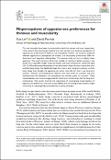Files in this item
Misperceptions of opposite-sex preferences for thinness and muscularity
Item metadata
| dc.contributor.author | Perrett, David I. | |
| dc.contributor.author | Lei, Xue | |
| dc.date.accessioned | 2020-05-26T09:30:01Z | |
| dc.date.available | 2020-05-26T09:30:01Z | |
| dc.date.issued | 2021-02 | |
| dc.identifier | 267649508 | |
| dc.identifier | 0ec460bc-46b1-4c51-9fc8-00801cf422d2 | |
| dc.identifier | 85085600285 | |
| dc.identifier | 000535058400001 | |
| dc.identifier.citation | Perrett , D I & Lei , X 2021 , ' Misperceptions of opposite-sex preferences for thinness and muscularity ' , British Journal of Psychology , vol. 112 , no. 1 , pp. 247-264 . https://doi.org/10.1111/bjop.12451 | en |
| dc.identifier.issn | 0007-1269 | |
| dc.identifier.other | ORCID: /0000-0002-6025-0939/work/74872954 | |
| dc.identifier.uri | https://hdl.handle.net/10023/19993 | |
| dc.description | The data that support the findings of this study will be openly available in Mendeley Data at http://dx.doi.org/10.17632/769zgnsm9w.1 following an embargo from 2020-08-09. | en |
| dc.description.abstract | Thin and muscular have been characterized as ideals for women and men, respectively. Little research has investigated whether men and women have accurate perceptions of opposite‐sex preferences of thinness and muscularity. Further, no study has explored whether opposite‐sex perceptions of thinness and muscularity preferences differ for short‐term and long‐term relationships. The present study set out to address these questions. We used interactive 3D human models to represent bodies varying in size (body mass index/BMI weight scaled by height) and body composition. University‐aged (18–31) White European heterosexual men and women were asked to choose their own and ideal body shape, the ideal body shape for a short‐ and a long‐term partner, and the body shape they thought the opposite‐sex would most like for short‐ and long‐term partners. Women overestimated the thinness that men prefer in a partner and men overestimated the heaviness and muscularity that women prefer in a partner. These misperceptions were more exaggerated for short‐term relationships than for long‐term relationships. The results illustrate the importance of investigating misperceptions of opposite‐sex preferences and raise the possibility that correcting misperceptions might have utility in reducing body dissatisfaction or eating disorders. | |
| dc.format.extent | 18 | |
| dc.format.extent | 928282 | |
| dc.language.iso | eng | |
| dc.relation.ispartof | British Journal of Psychology | en |
| dc.subject | Attractiveness | en |
| dc.subject | Body size | en |
| dc.subject | Misperception | en |
| dc.subject | Muscularity | en |
| dc.subject | Preferences | en |
| dc.subject | BF Psychology | en |
| dc.subject | DAS | en |
| dc.subject.lcc | BF | en |
| dc.title | Misperceptions of opposite-sex preferences for thinness and muscularity | en |
| dc.type | Journal article | en |
| dc.contributor.institution | University of St Andrews. Institute of Behavioural and Neural Sciences | en |
| dc.contributor.institution | University of St Andrews. Centre for Social Learning & Cognitive Evolution | en |
| dc.contributor.institution | University of St Andrews. School of Psychology and Neuroscience | en |
| dc.identifier.doi | 10.1111/bjop.12451 | |
| dc.description.status | Peer reviewed | en |
This item appears in the following Collection(s)
Items in the St Andrews Research Repository are protected by copyright, with all rights reserved, unless otherwise indicated.

